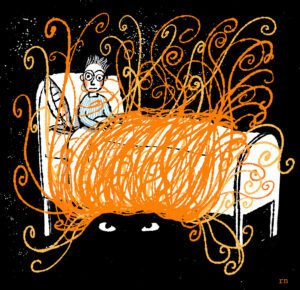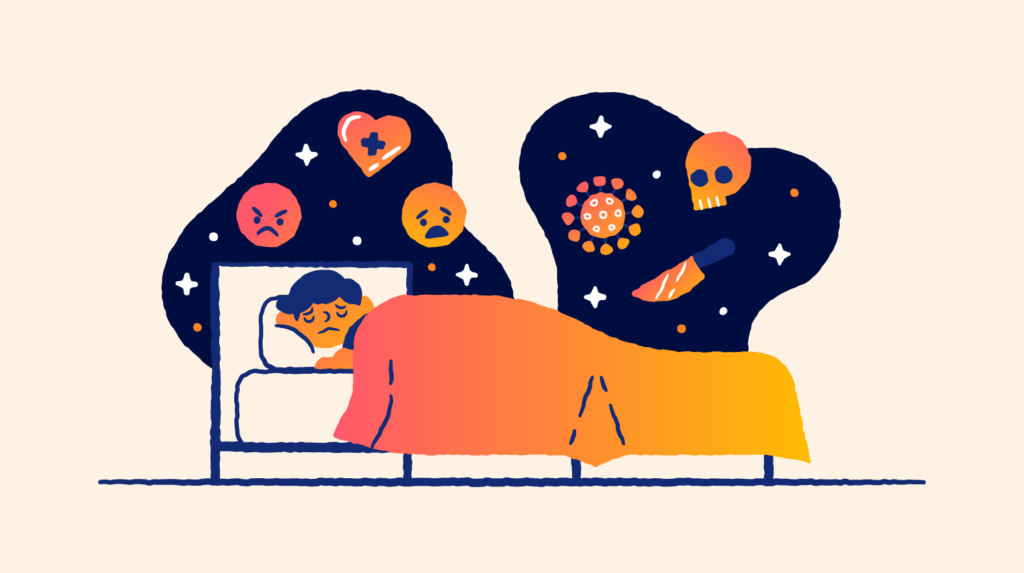Do you ever have those crazy dreams that don’t make any sense? You know, the ones where you’re being chased by a monster or you can’t find your way out of a maze? Chances are, those dreams are caused by stress. Stress dreams can be wacky and weird, but they can also be quite disturbing. In this blog post, we will discuss what stress dreams are, why they occur, and also how to deal with them. We will also provide some tips for preventing stress dreams from happening in the first place.
Contents
Defining Stress Dreams
 This phrase consists of two words that, when put together, create a very clear definition: stress (noun) and dream (verb). A “stress dream” is defined as a nightmare that occurs during periods of high stress. It’s worth noting that not all nightmares are considered to be stress dreams. For a nightmare to qualify as a “stress dream,” it must be directly caused by stress.
This phrase consists of two words that, when put together, create a very clear definition: stress (noun) and dream (verb). A “stress dream” is defined as a nightmare that occurs during periods of high stress. It’s worth noting that not all nightmares are considered to be stress dreams. For a nightmare to qualify as a “stress dream,” it must be directly caused by stress.
Now that we know what a stress dream is, let’s discuss why they occur. When you’re stressed, your body goes into fight-or-flight mode. This is a natural response that helps us to survive dangerous situations. During this time, your heart rate and blood pressure increase, and your body release hormones like adrenaline and cortisol.
These physical changes can also affect your brain activity. When you’re stressed, your brain is in a state of high alert. This can cause you to have nightmares or other disturbing dreams.
There are two types of stress that can lead to stress dreams: acute stress and chronic stress. Acute stress is the kind of stress that happens suddenly, such as in a car accident or a natural disaster. Acute stress can trigger a one-time event, such as a bad dream. This type of stress usually goes away on its own and doesn’t require treatment.
Chronic stress is the kind of stress that persists over time, such as job-related stress or financial problems. Chronic stress can lead to recurrent nightmares or other sleep problems, such as insomnia.
If you’re constantly stressed, it’s important to seek help from a doctor or therapist. They can provide you with coping strategies.
Examples
It has been an observation that stress dreams manifest in rather weird, unconventional, and symbolic ways. Although the meanings and interpretations can be subjective, studies and researchers have found some of the following to be the most commonly seen scenarios:
- Falling: This usually signifies a loss of control in real life. It could be something as simple as losing your footing, or it could be more serious, like losing your job.
- Teeth falling out: This is a common dream that can have many different interpretations. It could represent feelings of powerlessness or anxiety. It could also be a physical manifestation of stress, such as grinding your teeth at night.
- Taking a test: This dream is often seen in students who are stressed about exams. It can also represent feelings of anxiety or insecurity in other areas of your life.
- Being chased: This dream scenario usually signifies that you’re running away from something in your life. It could be an issue that you’re trying to avoid, or it could be a fear that you’re trying to escape.
- Being naked: This dream can be interpreted in a few different ways. It could represent feelings of vulnerability or insecurity. It could also be a sign that you’re feeling exposed in some way.
- Flying: This dream scenario can represent a number of different things. It could be a sign of freedom, or it could represent your desire to escape from a situation. It could also be a sign that you’re feeling out of control.
- Finding money: This dream can represent a number of different things, depending on the context. It could be a sign that you’re feeling lucky or fortunate. It could also be a sign that you’re about to come into some good luck.
- Dying: This dream can be interpreted in a few different ways. It could represent a fear of change. It could also be a sign that you’re feeling overwhelmed or stressed. It could also be a sign that you’re facing a major life change.
All these are just a few examples of stress dreams and their possible interpretations. If you’re having stress dreams, it’s important to remember that they’re just dreams. They don’t necessarily reflect what’s going on in your life. However, if you’re having stress dreams on a regular basis, it’s a good idea to talk to a doctor or therapist. They can help you identify the source of your stress and provide you with coping strategies.
Risk Factors
 We know the basic cause of stress dreams is stress, but not everyone who experiences stress will have them. So what makes some people more prone to having stress dreams? Here are some risk factors that can make a person vulnerable to these types of dreams.
We know the basic cause of stress dreams is stress, but not everyone who experiences stress will have them. So what makes some people more prone to having stress dreams? Here are some risk factors that can make a person vulnerable to these types of dreams.
- Sleeping problems: If you have difficulty falling asleep or staying asleep, you’re more likely to experience stress dreams.
- Anxiety disorders: People with anxiety disorders are more likely to have stress dreams. This is because anxiety can lead to sleep problems and cause intrusive thoughts during the day.
- Post-traumatic stress disorder: People with PTSD often have nightmares about their traumatic experiences. These nightmares can be so realistic that they can wake you up from sleep.
- Obsessive-compulsive disorder: People with OCD often have intrusive thoughts that can become stress dreams.
- Schizophrenia: People with schizophrenia often have hallucinations and delusions. These can sometimes manifest as stress dreams.
- Depression: Depression can also lead to sleep problems and intrusive thoughts. This can make it more likely for you to have stress dreams.
- Stressful life events: Major life changes, such as a death in the family or a divorce, can lead to stressful dreams.
- Substance abuse: Substance abuse can also lead to sleep problems and intrusive thoughts. This can make it more likely for you to have stress dreams.
If you think you might be at risk for stress dreams, talk to your doctor or mental health professional. They can help you identify the source of your stress and provide you with coping strategies. There are a number of different ways to deal with stress dreams.
Consequences
 Stress and bad dreams can have a number of different consequences. These can range from mild to severe. They also impact various aspects of life.
Stress and bad dreams can have a number of different consequences. These can range from mild to severe. They also impact various aspects of life.
Physical impacts
When our sleep is disrupted, it can have physical consequences. This is because sleep is important for our overall health and well-being. When we don’t get enough sleep, it can lead to:
- Fatigue
- Headaches
- Irritability
- Weight gain
- Stroke
- Breathing issues
- Decreased immunity
- Stomach problems
- Chest pains
Emotional and cognitive impacts
Bad dreams can also have mental and emotional consequences. This is because they can cause anxiety and stress. This can lead to:
- Irritability
- Poor concentration
- Brain fog
- Chronic stress
- Memory problems
- Poor decision-making
- Mood swings
- Drowsiness
- Memory problems
Behavioral impacts
Lack of sleep can also lead to behavioral problems. This is because it can impact our ability to make good decisions. It can also lead to:
- Angry outbursts
- Reckless behavior
- Acting impulsively
- Paranoia
- Anxiety
- Depression
- Aggression
All these consequences can have a negative impact on our lives. They reduce the quality of life and can also lead to more serious problems. If you’re having stress dreams on a regular basis, it’s important to talk to a doctor or therapist. They can further help you identify the source of your stress and provide you with coping strategies.
Ways To Deal With It
Luckily, there are a number of different ways to deal with stress dreams. This can happen either through self-help tips or by seeking help from a professional.
Self-help tips
Self-care can be the ultimate form of stress relief. It can help you relax as well as feel more in control. When it comes to dealing with stress dreams, some self-care tips include:
- Identify your triggers: When you know what’s causing your stress dreams, you can take steps to avoid them.
- Maintain a journal: Keeping a journal can help you track your dreams and figure out patterns. You can even use it to brainstorm solutions to your stress dreams.
- Create a bedtime routine: Having a bedtime routine can help you relax and prepare for sleep. This can include things like reading or taking a bath.
- Practice relaxation techniques: Relaxation techniques can help you reduce stress. They work by slowing down your heart rate and breathing. Some of the most common relaxation techniques include yoga, meditation, and deep breathing.
- Make a comfortable sleeping space: Creating a comfortable sleeping environment can help you get a good night’s sleep. This can happen by using comfortable sheets, a noise machine, and an eye mask.
- Get enough sleep: This can be difficult if you’re dealing with stress. But, getting enough sleep is important for reducing stress. Make sure to get at least seven to eight hours of sleep every night.
- Exercise: Exercise can help reduce stress and improve sleep. It can also help you feel more in control of your body.
- Eat a healthy diet: Eating healthy can help your body cope with stress.
- Avoid alcohol and drugs: Alcohol and drugs can make stress worse. They do so by disrupting sleep and increasing anxiety.
Adapting these habits and strategies can help you reduce stress and get better sleep. If you’re still having trouble, it might be time to seek professional help.
Professional treatments
 If self-care doesn’t seem to be helping, seeking external help might be the best option. This is because professionals can help you identify and treat the underlying cause of your stress. Some common professional treatments for stress dreams include:
If self-care doesn’t seem to be helping, seeking external help might be the best option. This is because professionals can help you identify and treat the underlying cause of your stress. Some common professional treatments for stress dreams include:
- Medication: If you’re having stress dreams on a regular basis, your doctor may prescribe medication. This can help to reduce the frequency and severity of your dreams. Some of the most effective medicines include:
Selective serotonin reuptake inhibitors (SSRIs)
Tricyclic antidepressants (TCAs)
Monoamine oxidase inhibitors (MAOIs)
Benzodiazepines
Sleeping aids
It is important to work closely with your doctor when taking medication. This is because some medicines can have side effects.
- Therapy: If you’re having stress dreams on a regular basis, your doctor may refer you to a therapist. This can help you identify the source of your stress and provide you with coping strategies. Some of the most widely practiced therapies include types such as:
Cognitive behavioral therapy (CBT)
Eye movement desensitization and reprocessing (EMDR)
Clinical hypnosis
Expressive art therapy
Your respective therapist will work with you to find the best treatment option.
- Support groups: There are also support groups available for people who have stress dreams. This can provide you with support and advice from others who are dealing with the same problem.
- Natural therapies: These are a rather new form of treatment, but they can be effective. Natural therapies work by incorporating lifestyle changes and natural remedies. This can help to reduce stress and improve sleep. Some common approaches in this technique are:
Aromatherapy
Biofeedback
Acupuncture
Massage therapy
Acupressure
Light therapy
Making the decision to seek professional help can be difficult. But, it’s important to remember that you don’t have to go through this alone. There are a number of resources available to help you deal with your stress dreams.
Conclusion
In the end, we can conclude that stress dreams can be a nuisance. They mean different things to different people, but they often result from stress. If you’re having trouble dealing with your stress dreams, there are a number of options available to you. These include self-care, medication, therapy, and natural therapies. You don’t have to go through this alone.
If you or someone you know is looking for psychological help, Therapy Mantra is here for you. We are the leading providers of online therapy and counseling. Our team of highly trained and experienced therapists can provide assistance at the most affordable rates. Contact us today to learn more about our services. You may also visit our website to book an online therapy session or download our free Android or iOS app for more information.


